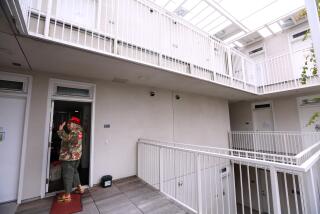Bradley Backs New Tax to Add Police : Hiring of 1,000 Officers Would Be Financed by Compromise
Los Angeles Mayor Tom Bradley, fighting criticism from mayoral opponent John Ferraro that he has not supported the Police Department, Monday endorsed a compromise plan to add 1,000 officers to the force through a new property tax.
The tax proposal, if approved by the Los Angeles City Council, would be placed on the June ballot. The new tax, which would cost the average homeowner $58 a year, would require two-thirds voter approval. If it is passed, 200 officers would be added annually to the force over a five-year period. That is in addition to the average 350 recruits trained each year to replace retiring officers.
The council shelved a plan last month to place a measure on the April ballot when members could not decide how many officers to propose and how to pay for the addition. In order to place the latest proposal on the June ballot, the council must initiate action by Feb. 13.
Bradley, joined at a press conference by Council President Pat Russell and members Zev Yaroslavsky and Joan Milke Flores, said that he and the council are committed to placing a measure on the ballot to increase the police force and that the sticking point had been “the appropriate kind of proposal that was fair, equitable and reasonable. It is our hope and expectation that people would be willing to vote for such a measure.”
There is “clearly not enough in the existing revenue base” to finance additional officers, he added.
Ferraro said after the press conference that he believes his entry into the mayor’s race encouraged Bradley to support a plan for more police; he said he will announce his own plan Thursday to increase the force by 300 without a tax increase.
“Now Bradley wants to tax the people for what he took away,” Ferraro said, referring to his argument that the mayor has depleted the strength of the department.
Bradley has said that reduced revenues were responsible for a reduction in the force in the last few years. Voters in 1981 soundly rejected a measure that would have raised taxes to increase the size of the Police Department. Critics said the plan was unfair for two reasons. One, the proposal was based on the size of a lot and did not take into account whether it was vacant land or a high-rise building. Second, homeowners with the same size lots would pay the same taxes, regardless of the value of the property. That proposal was defeated in all sections of the city.
The current plan appears to address the first criticism of the 1981 proposal. “In the old one, a vacant parking lot would be the same as a 70-story building,” Bradley said. “We are eliminating that inequity.” Under the current proposal, vacant land would be taxed at a rate much lower than the same amount of property that includes a house, commercial or industrial building.
Owners of an average 1,500- square-foot home would still pay the same, whether the home is in an affluent or poor section of town.
Based on state legal precedents, “we cannot levy on the basis of value (of the home),” said City Administrative Officer Keith Comrie.
Russell said she is certain the council has a “unanimous commitment to increasing the number of police officers.” The plan will be discussed in three council committees before it goes before the full council. She did not predict whether the council would actually approve the measure for the ballot.
More to Read
Sign up for Essential California
The most important California stories and recommendations in your inbox every morning.
You may occasionally receive promotional content from the Los Angeles Times.










